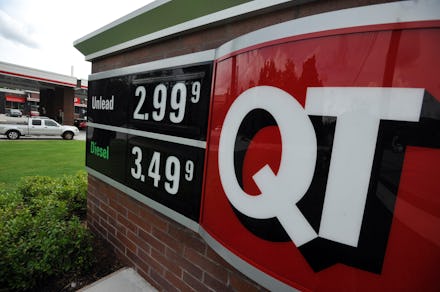Gas Prices Are Finally Down — and They May Just Stay That Way

Gasoline prices, like prices of any commodity, are determined by many factors including supply-and-demand, government policy, and even the weather. Gasoline is unique, however, because it is very nearly the only energy source used in transportation. Its monopoly on transportation amplifies the impact its price has on the economy. Low gas prices translate to more disposable income for American consumers and lower costs for goods that require transportation, such as food or clothing.
Despite a rise in oil prices, gasoline prices recently dropped from their summer peak in July to their lowest level in eight months. Analysts forecast that prices could drop by another 30 cents by the end of the year.
The biggest short-term cause of falling prices is a seasonal change in supply and demand. Every year on September 15, the Environmental Protection Agency allows gasoline manufacturers to resume production of winter-blend gasoline, which contains a higher concentration of butane. Butane is significantly cheaper than pure gasoline but also evaporates more easily, especially in the summer heat. Producers thus have to dial back their butane use during the summer but can safely ramp it up in the winter.
The resumption of winter-blend gasoline begins just as the summer driving season comes to an end. The result is a gas price perfect storm: Demand drops off just as gasoline becomes cheaper to produce.
The timing also happens to coincide with the start of election season. While there are no major elections this November, expect to see accusations of price manipulation by big oil companies when gas prices almost assuredly dip right at the start of midterm election season.
Consumers also owe this year’s low gas prices to an especially mild hurricane season. In 2005, Hurricane Katrina disrupted oil production and wrecked refineries along the coast. Prices jumped from $3.00 to $5.00 a gallon almost overnight. And while this year's hurricane season isn’t over yet, its impact on fossil fuel prices has been almost nonexistent so far.
Given these short-term trends, it’s no surprise that gas prices have gone down in the last few months. But there are some long-term trends that may cause gas prices to remain relatively stable for some time to come. Good government policy can help encourage these trends and bolster the economic stimulus they will have.
Thanks to the development of shale fields in the U.S., the geopolitics of oil are changing rapidly. Just this month, the Wall Street Journal reported that by the end of the year, the United States will surpass Russia in oil production and, by 2014, may take the top spot from Saudi Arabia as the biggest producer in the world. The U.S. also happily passed the world’s-biggest-oil-importer torch on to China, who may hold onto it for a while.
The America’s new position as an energy leader won’t necessarily translate into lower prices at the pump. As a recent article in Foreign Affairs put it, “The oil market is like a pool into which producers pour oil and from which consumers take it out. It does not matter so much who purchases which oil from whom.”
Nevertheless, the boom in U.S. production will provide some level of insulation from instability in the Middle East and resulting spikes in oil prices. The more stability in the price of oil, the better off American consumers will be in the long term. The president can encourage the development of shale fields by limiting overzealous environmental regulations and encouraging more oil and gas leases on federal lands.
Gasoline prices are also being driven down by more fuel-efficient cars, which reduce demand. Efficiency standards will be raised to 50 miles per gallon by 2025. While this may not be as efficient as a gasoline tax in reducing demand, gasoline use will gradually decline as old cars are replaced by more efficient ones.
The president has vowed to combat climate change. That undoubtedly will require a marked decline in fossil fuels of all types, including gasoline. But as the economy continues to falter, the economic boost of cheap gas will be a welcome trend.